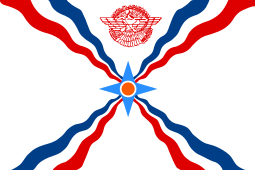Assyrians/Syriacs in Sweden
| Total population | |
|---|---|
| (120,000[1]) | |
| Regions with significant populations | |
| Södertälje, Stockholm, Gothenburg, Örebro, Västerås, Norrköping, Linköping | |
| Languages | |
| Neo-Aramaic, Swedish, (some knowledge of Turkish, Arabic, Kurdish and Persian) | |
| Religion | |
| Assyrian Church of the East, Ancient Church of the East, Chaldean Catholic Church, Syriac Orthodox Church and Syriac Catholic Church |
Assyrians/Syriacs (Swedish: Assyrier/Syrianer) in Sweden mainly came due to ethnic and religious conflicts from Turkey, Syria, Lebanon, Iraq and Iran that largely corresponds with the Assyrian homeland, including parts of what is now primarily northern Iraq, northeastern Syria, northwestern Iran, and southeastern Turkey.[2] Also, some of the first Assyrians came from other Western Asian countries outside of the Assyrian homeland like Lebanon, Jordan, and Armenia. Those who had already lived in Sweden for a longer period were finally granted residence permit for humanitarian reasons.[3]
Population
The Assyrian/Syriac community in Sweden numbers an estimated 30–40,000 people (2016). An estimated 18,000 live in Södertälje,[4] which is seen as the unofficial Assyrian/Syriac capital of Europe due to the city's high percentage of Assyrians/Syriacs.
Identity
There is an ideological division of this group in Sweden between[5]
- Aramaenists, adherents of the Syriac Orthodox Church (West Syrian Rite) who insist on the name Syrianer and an "Aramaean" heritage for the group.
- Assyrianists of various denominational backgrounds, who de-emphasize religious adherence in favour of pre-Christian antiquity, who insist on the name Assyrier and an Assyrian heritage for the group.
To account for this division, official Swedish sources refer to the group as "Assyrier/Syrianer", with a slash (similar to the US census, which opted for "Assyrian/Chaldean/Syriac").
History
The first Assyrians/Syriacs arrived in 1967 as refugees from Lebanon (see Lebanese Civil War), numbering some 200 people.[6]
The migration to Sweden may be broken up into a number of distinct periods: early settlement and the subsequent waves of migration sparked by the Assyrian genocide in present-day Turkey, the Turkish invasion of Cyprus in 1974, the Iranian Revolution of 1979 and, more recently, during the 2000s, an unprecedented immigration wave from Iraq and Syria reached Sweden as a result of the Iraq Wars (Gulf War in 1991, Iraq War in 2003, Iraqi Civil War in 2014–present) and the Syrian Civil War in 2011–present.
Sports and Media activities
The Swedish authorities have granted many rights for Assyrian/Syriacs including their own professional football (soccer) teams like Assyriska FF and Syrianska FC. Also, the Swedish authorities have granted the right of Assyrians to broadcast international TV-channels like Suryoyo Sat and Suroyo TV from the Swedish territory.
Notable people
- Kennedy Bakircioglu
- Abgar Barsom
- Stefan Batan
- Ibrahim Baylan
- Fares Fares
- Josef Fares
- Andreas Haddad
- Yilmaz Kerimo
- Nuri Kino
- Josef Özer
- Gabriel Özkan
- Ninsun Poli
- Suleyman Sleyman
- Sharbel Touma
- Elias Zazi
- Denho Acar
- David Durmaz
- Isa Demir
- Stephan Yüceyatak
- Aboud Zazi
- Nisha Besara
- Daniel Boyacioglu
References
- ↑
- ↑ Sargon Donabed (1 February 2015). Reforging a Forgotten History: Iraq and the Assyrians in the Twentieth Century. Edinburgh University Press. pp. 18–. ISBN 978-0-7486-8605-6.
- ↑ Swedish Minister for Development Co-operation, Migration and Asylum Policy, Migration 2002, June 2002 Archived September 26, 2006, at the Wayback Machine.
- ↑ Prakash Shah; Marie-Claire Foblets (15 April 2016). Family, Religion and Law: Cultural Encounters in Europe. Routledge. p. 183. ISBN 978-1-317-13648-4.
- ↑ Dan Lundberg, Christians from the Middle East
- ↑ Tore Wizelius; Lars-Sune Hansson; Sweden. Referensgruppen för folkrörelsefrågor; Sweden. Statens invandrarverk (1984). Föreningar bland invandrare och minoriteter i Sverige. Statens invandrarverk. p. 53.
Sources
- Svenska kommunförbundet (1982). Assyrier/syrianer: tipskatalog : några fakta om gruppen och några exempel från kommunal verksamhet. Kommunförb.
- Knutsson, Bengt (1982). Assur eller Aram: språklig, religiös och nationell identifikation hos Sveriges assyrier och syrianer. Statens invandrarverk (SIV).
- Klich, I., and Ingvar Svanberg. "Assyrier/syrianer" i." Det mångkulturella Sverige (1988).
- Yalcin, Zeki. "Svenskar och assyrier/syrianer kring sekelskiftet 1900." Multiethnica. Meddelande från Centrum för multietnisk forskning, Uppsala universitet 29 (2003): 24-28.
- Björklund, Ulf. North to another country: the formation of a Suryoyo community in Sweden. Vol. 9. Dept. of Social Anthropology, University of Stockholm, 1981.
- Atman, Sabri. Assyrier-Syrianer. Mesopotamien, 1996.
- Barsom, Gabriella. "En studie om assyriska/syrianska ungdomars språkbruk och språkidentiteter." (2006).
- Berntson, Martin. "Assyrier eller syrianer? Om fotboll, identitet och kyrkohistoria." rapport nr.: Humanistdag-boken 16 (2003).


